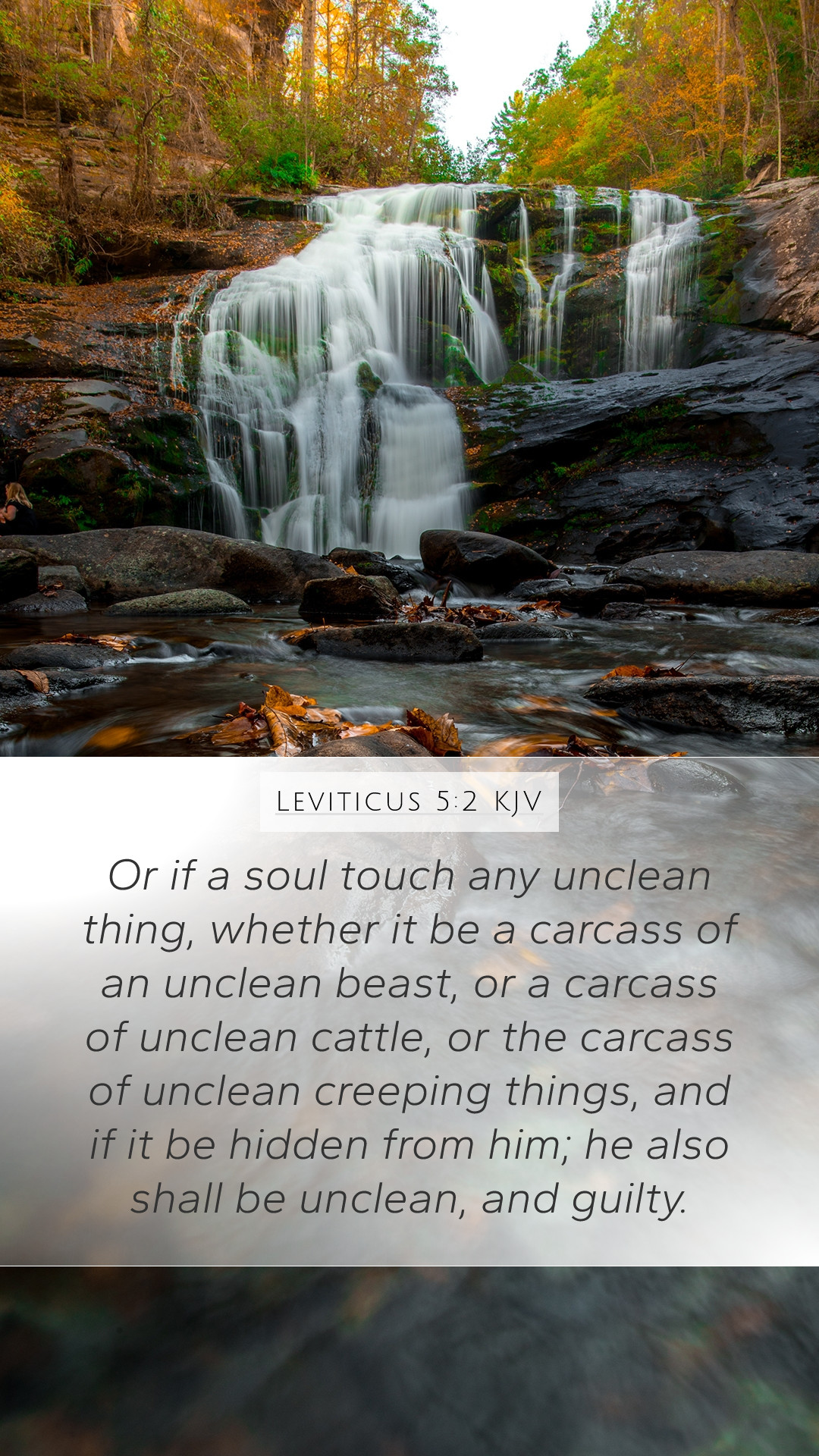Bible Verse Commentary on Leviticus 5:2
Leviticus 5:2 states: "Or if a soul touch any unclean thing, whether it be a carcass of an unclean beast, or a carcass of unclean cattle, or the carcass of unclean creeping things, and if it be hidden from him; he also shall be unclean, and guilty."
Understanding the Verse
This verse outlines conditions under which an individual becomes ceremonially unclean according to the Mosaic Law. It emphasizes the importance of being aware of one's surroundings and the need for purity in communal worship and relationships with God.
Bible Verse Meanings and Interpretations
-
Matthew Henry Commentary:
Matthew Henry notes that the sensitivity to uncleanliness reveals God’s desire for His people to maintain holiness. The mention of 'hidden' implies that unintentional transgressions still carry consequences, highlighting God's standards and the need for personal vigilance.
-
Albert Barnes Notes:
Albert Barnes elaborates that touching an unclean thing results in ceremonial defilement, which interrupts one’s fellowship with God. The phrase also suggests that ignorance does not exempt one from the responsibilities of the law. Unintentional sins still result in guilt, and conscious awareness of the Law is paramount.
-
Adam Clarke’s Commentary:
Adam Clarke discusses the significance of the term 'soul' and how it refers to the individual as a whole. He explains that this law underscores the importance of purity, not just physically but also spiritually. The consequences of touching unclean things symbolize the broader implications of moral impurity.
Key Themes in Leviticus 5:2
The primary insights gathered from public domain commentaries suggest several key themes:
- Awareness of Sin: The verse teaches the necessity for individuals to remain vigilant about their actions and surroundings.
- Ceremonial Cleanliness: It emphasizes the importance of ritual purity in ancient Israel, which was deeply tied to their relationship with God.
- Implications of Ignorance: The text suggests that ignorance of the law does not excuse an individual from guilt.
- Community Standards: The laws served to maintain communal standards of holiness, reflecting God’s character and intentions for His people.
Contextual Insights
Leviticus as a whole addresses various laws regarding purity and uncleanliness, serving to instruct the Israelites in maintaining a proper relationship with God. The Israelites were called to be a holy nation, set apart from surrounding nations, and these laws delineate the boundaries for their conduct.
Cross References
Several biblical passages relate closely to the themes expressed in Leviticus 5:2:
- Leviticus 11: Discusses clean and unclean animals, establishing foundational laws for dietary practices.
- Numbers 19:11-22: Provides instructions about purification after contact with the dead.
- 1 Peter 1:16: Calls believers to be holy, as God is holy, reflecting the New Testament continuation of these themes.
Conclusion
In summary, Leviticus 5:2 serves as a reminder of the importance of holiness and the need for awareness in our actions. Understanding this scripture is foundational for grasping biblical principles of cleanliness, both ceremonially and morally. It invites deeper reflection on how ancient laws apply to modern believers, especially in the context of understanding Scripture and engaging in Bible study.
Further Study Recommendations
For those seeking deeper insights into this verse and its implications, consider engaging in:
- Bible study groups focused on Levitical laws.
- Online Bible study courses that address Old Testament laws.
- Utilizing Bible study tools and resources to explore cross-references and thematic connections.


